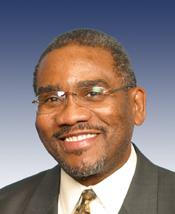

10:00 am EDT - 11:15 am EDT
Past Event
On June 22, Foreign Policy at Brookings gathered to address the implications of China’s role as a global actor for American foreign policy and for the broader international order. The event also served to launch a recent edited volume from the Brookings Institution Press, “Global China: Assessing China’s Growing Role in the World.” The program featured keynote remarks from House Foreign Affairs Committee Chairman Gregory Meeks, who urged that America will be best positioned to compete with China if the United States leads with confidence, engages with the world again, and leverages its strengths.
Chairman Meeks described Chinese President Xi Jinping as having enhanced party control domestically by cracking down on economic and political freedom on the one hand, and enhancing the international influence and dominance of the People’s Republic of China on the other. However, Chairman Meeks emphasized that China is not as invincible as some may think. He noted that Congress has an important role to play in renewing American institutions and competitiveness at home and sustaining American engagement and leadership abroad. Further, he discussed the “Ensuring American Global Leadership and Engagement,” or EAGLE Act, which he introduced earlier this year, explaining that the act aims to increase U.S. economic competitiveness and hold China accountable for human rights abuses.
Following his remarks, Senior Fellow and Michael Armacost Chair in the Foreign Policy program at Brookings Ryan Hass moderated a panel discussion featuring three Brookings scholars and contributors to the Global China project. Brookings Nonresident Senior Fellow Caitlin Talmadge began by describing the interrelationship between the United States and China’s nuclear and conventional capabilities. She observed that the U.S. has traditionally opted for a strategy of transparency regarding its arsenal, whereas China is significantly more opaque. She encouraged Washington to “think about the pros and cons of acknowledging [mutual vulnerability] as an entry way to dialogue.”
Brookings Nonresident Fellow Pavneet Singh turned the conversation to technology and innovation, noting that these are often indicators of “economic capacity, economic prosperity, and [are] ultimately critical to national security.” Singh described China’s efforts to close the innovation gap with the United States and offered suggestions for steps the United States could take to enhance its technological competitiveness, such as advances to artificial intelligence and cybersecurity.
Tanvi Madan, senior fellow and director of the India Project at Brookings, examined the Sino-Indian relationship and its implications for American interests. She also explored Russia’s role among these major powers, noting that Russia’s close relationship with China has been a growing concern for India. Overall, Madan argued that it is in America’s best interest to encourage India and other U.S. partners to strengthen their capabilities and play a more active and engaged role in the Indo-Pacific.
The panelists agreed that both the U.S. government and citizens around the world contribute to the resounding wealth of knowledge and collaboration that have, and will continue, to limit the potential risks posed by China’s increasing role as a political actor.
Moderator

Keynote

Moderator

Panelist



Ling Chen, Ryan Hass, Jennifer Kavanagh, Michael E. O’Hanlon, Bruce Jones, Mireya Solís, Thomas Wright
July 2, 2025

Pavel K. Baev, Robert Einhorn, Sharan Grewal, Samantha Gross, Ryan Hass, Patricia M. Kim, Elizabeth N. Saunders, Yun Sun, Caitlin Talmadge, Shibley Telhami, Andrew Yeo
July 1, 2025

Ryan Hass
July 1, 2025